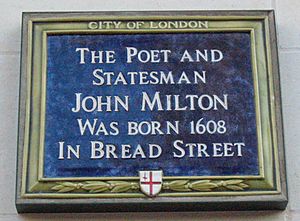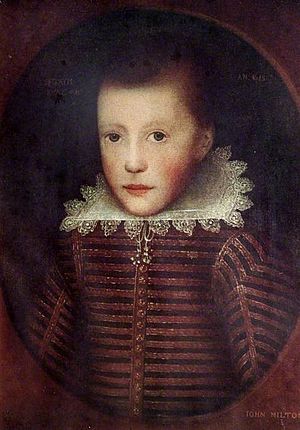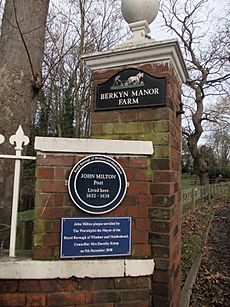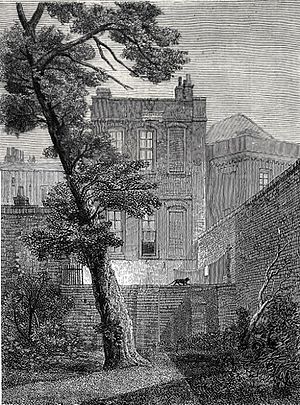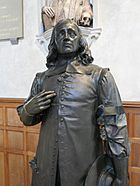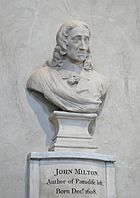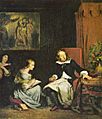John Milton facts for kids
Quick facts for kids
John Milton
|
|
|---|---|
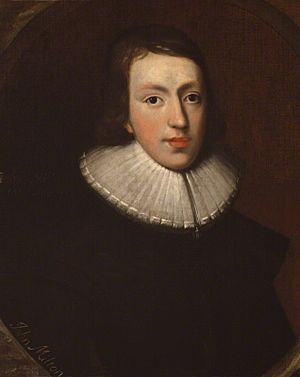
Portrait of Milton, c. 1629
|
|
| Born | 9 December 1608 Bread Street, Cheapside, London, England
|
| Died | 8 November 1674 (aged 65) Bunhill Row, London, England
|
| Resting place | St Giles-without-Cripplegate |
| Alma mater | Christ's College, Cambridge |
| Occupation |
|
| Spouse(s) |
Mary Powell
(m. 1642; Katherine Woodcock
(m. 1656; Elizabeth Mynshull
(m. 1663) |
| Children | 5 |
| Writing career | |
| Language | English, Latin, Greek, Hebrew, French, Spanish, Italian, Old English, Dutch, Aramaic, Syriac |
| Notable works | Paradise Lost Areopagitica Lycidas |
| Signature | |
John Milton (born December 9, 1608 – died November 8, 1674) was a famous English poet and thinker. He is best known for his long poem, Paradise Lost, published in 1667. This epic poem tells the story of the fall of man, including how Satan tempted Adam and Eve and how God sent them out of the Garden of Eden.
Milton lived during a time of big changes in England, both in religion and politics. He also worked for the government of England under Oliver Cromwell. He was a strong supporter of freedom of speech and freedom of the press. His book Areopagitica (1644) argued against censorship, which means stopping books or ideas from being published. Milton also liked to create new words from Latin and Greek for the English language. He was one of the first writers to use poetry without rhymes, which is called blank verse, outside of plays.
Many people, like the writer William Hayley, called Milton the "greatest English author." He is still seen as one of the most important writers in the English language. Famous poets like William Blake and William Wordsworth admired his work greatly.
Milton's life followed the big changes happening in England during the Stuart period. He studied at Christ's College, Cambridge and traveled. He wrote poems and also became a pamphleteer, writing short books about political ideas. He worked for the government during the English Civil War, a time when England was fighting itself. After the king returned to power in 1660, Milton lost his public job and became blind. But during this time, he wrote his most famous works.
Contents
Early Life and School
John Milton was born in Bread Street, London, on December 9, 1608. His father, also named John Milton, was a composer. His father had been disowned by his own family for becoming a Protestant instead of staying Catholic. In London, Milton's father became a successful scrivener, which was like a notary or clerk. He was also a talented musician, and this made young John Milton love music too.
Because his family was well-off, Milton had a private teacher named Thomas Young. Young was a Scottish Presbyterian and introduced Milton to new religious ideas. After this, Milton went to St Paul's School in London. There, he started learning Latin and Greek, which greatly influenced his writing.
Milton started writing poems when he was about 15. His younger brother, Christopher, said that John "studied very hard and sat up very late, commonly till twelve or one o'clock at night." People at school even called him "the Lady of Christ's College" because he was very fair-skinned.
In 1625, Milton went to Christ's College, Cambridge at the University of Cambridge. He earned his first degree in 1629 and his Master's degree in 1632. He was thinking about becoming an Anglican priest.
Some stories say Milton was suspended from Cambridge in his first year for arguing with his teacher. He was definitely home in London for a while in 1626. It's also possible he was sent home because of the plague that affected Cambridge in 1625.
At Cambridge, Milton made friends with Edward King, to whom he later dedicated a poem called "Lycidas". He also befriended Roger Williams, a theologian. Milton taught Williams Hebrew, and Williams taught Milton Dutch. Even though he was known for his poetry, Milton sometimes felt different from his classmates. He thought they were silly when they tried to perform comedies.
Milton also didn't like the university's old-fashioned way of teaching, which involved formal debates in Latin. While at Cambridge, he wrote some of his well-known shorter poems, like "On the Morning of Christ's Nativity" and "Epitaph on the admirable Dramaticke Poet, W. Shakespeare."
Studying, Writing, and Traveling
After getting his Master's degree in 1632, Milton moved back home with his father. He lived in Hammersmith and later in Horton, Berkshire. For six years, he studied on his own, reading many books on religion, philosophy, history, and literature. This intense study made him one of the most learned English poets ever. Besides English, he knew Latin, Greek, Hebrew, French, Spanish, and Italian. He later learned Old English and Dutch.
Milton kept writing poetry during this time. His plays Arcades and Comus were written for special performances for rich families. Comus talks about being pure and self-controlled. He also wrote Lycidas, a sad poem for his friend Edward King who died.
In May 1638, Milton went on a 15-month trip to France and Italy. He wanted to learn more about art and different religious traditions, especially Roman Catholicism. He met famous thinkers and showed off his poetry skills. He visited Paris, Florence, and Rome. In Florence, he met the famous astronomer Galileo, who was under house arrest at the time.
Milton originally planned to travel to Sicily and Greece, but he heard "sad news of civil war in England" and decided to return home in the summer of 1639. He also learned that his childhood friend Diodati had died. He spent a few more months traveling in Europe before finally arriving back in England in July or August 1639.
Civil War, Writings, and Marriage
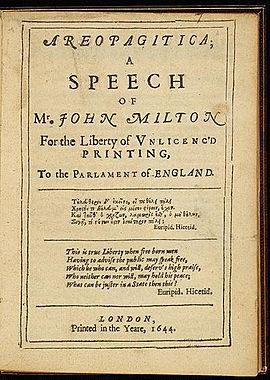
When Milton returned to England, the country was heading towards a civil war. He started writing essays, called tracts, against the Church of England's bishops, supporting the Puritan and Parliamentary side. He strongly criticized the Church of England's leaders.
Milton's father's investments supported him, but Milton also became a private teacher. He taught his nephews and other children from wealthy families. This experience led him to write Of Education in 1644, where he suggested ways to improve universities.
In June 1642, when he was 34, Milton married Mary Powell, who was 17. Their marriage had a difficult start. Mary didn't like Milton's strict lifestyle and didn't get along with his nephews. Milton also found her views too royalist, meaning she supported the King, while he supported Parliament. Mary soon went back to her parents and didn't return until 1645, partly because the Civil War had started. After they got back together, she had two daughters quickly.
Secretary for Foreign Languages
After Parliament won the Civil War, Milton used his writing to support the new government, called the Commonwealth. His book The Tenure of Kings and Magistrates (1649) argued that people have the right to hold their rulers accountable. This book helped him get a job as Secretary for Foreign Languages for the Council of State in March 1649. His main job was to write letters for England's government in Latin and other languages. He also wrote to promote the government's ideas and sometimes acted as a censor.
In October 1649, Milton published Eikonoklastes, defending the execution of King Charles I. This was a response to a popular book called Eikon Basilike, which made the King seem like a Christian hero. The next year, Milton was asked to write a defense of the English people against critics from other countries.
On February 24, 1652, Milton published his Latin book Defensio pro Populo Anglicano, also known as the First Defence. His clear Latin writing and knowledge made him famous across Europe.
By 1652, Milton had become completely blind. The exact reason is not known, but it was likely a problem with his eyes like retinal detachment or glaucoma. Because he couldn't see, he had to dictate his poems and essays to assistants. One of these assistants was the poet Andrew Marvell. One of Milton's most famous sonnets, "When I Consider How My Light is Spent" (often called "On His Blindness"), is believed to be from this time.
The King Returns
When Oliver Cromwell died in 1658, the English government fell apart. Milton, however, still believed strongly in the ideas that had led him to support the Commonwealth. He wrote several proposals to keep England a non-monarchy, even though many people wanted the king back. His book The Ready and Easy Way to Establish a Free Commonwealth (1660) was a passionate but unsuccessful plea for England to remain a republic.
When the king, Charles II, returned to power in May 1660, Milton feared for his life and went into hiding. A warrant was issued for his arrest, and his writings were burned. He later reappeared after a general pardon was given, but he was still arrested and briefly put in prison. His influential friends, like Andrew Marvell, helped him get out.
Milton married for the third and final time on February 24, 1663, to Elizabeth Minshull, who was 24. He was 54. Despite the age difference, their marriage seemed happy. He spent the last ten years of his life living quietly in London. During the Great Plague of London, he moved to a cottage in Chalfont St. Giles, which is his only home still standing today.
During this time, Milton published some smaller works, like a grammar textbook and a History of Britain. His only political writings from this period were Of True Religion (1672), which argued for religious tolerance (except for Catholics), and a translation of a Polish writing.
Death
John Milton died on November 8, 1674. He was buried in the church of St Giles-without-Cripplegate in London. Sources disagree on whether he died from tuberculosis or gout. A monument to him was added in the church in 1793.
Family Life
Milton and his first wife, Mary Powell (1625–1652), had four children:
- Anne (born 1646)
- Mary (born 1648)
- John (born 1651, died 1652)
- Deborah (born 1652, died 1727)
Mary Powell died on May 5, 1652, shortly after Deborah's birth. Milton's daughters lived to be adults, but he often had a difficult relationship with them.
On November 12, 1656, Milton married Katherine Woodcock. She died on February 3, 1658, less than four months after giving birth to their daughter, Katherine, who also died.
Milton married for a third time on February 24, 1663, to Elizabeth Mynshull (1638–1728). She was the niece of a rich apothecary from Manchester. Despite a 31-year age difference, their marriage seemed happy and lasted until Milton's death.
His nephews, Edward and John Phillips, were taught by Milton and became writers themselves. Edward was Milton's first biographer, writing about his life.
Milton's Poetry
Milton's poems were not always published under his own name right away. His first published poem, "On Shakespeare" (1630), appeared anonymously in a collection of William Shakespeare's plays. His collection 1645 Poems was the only poetry published under his name until Paradise Lost came out in 1667.
Paradise Lost: His Masterpiece
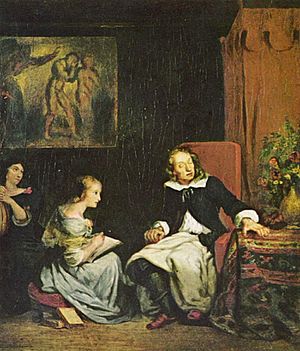
Milton's greatest work, the epic poem Paradise Lost, was written between 1658 and 1664. He was blind and poor when he wrote it. He dictated the poem to various helpers. Some people believe the poem shows his sadness about the failure of the English Revolution, but also his hope for human potential.
On April 27, 1667, Milton sold the rights to Paradise Lost to a publisher for £5. This was a small amount of money, but he would get more if the book sold well. The first edition sold out in 18 months.
After Paradise Lost, Milton published its sequel, Paradise Regained, along with a play called Samson Agonistes in 1671. These works also show Milton's feelings about the political situation after the king returned. Just before he died in 1674, Milton oversaw a second edition of Paradise Lost.
Milton's Ideas
Milton had many unique religious and political ideas. He was a Puritan, but he often had his own strong beliefs that didn't always fit with what everyone else thought. He believed in the importance of a person's own conscience.
His Philosophy
Milton's beliefs were generally in line with Protestant Christianity. Some scholars believe that by the late 1650s, Milton might have thought about the idea that everything in the universe, from stones to minds and even God, is made of a single, living material. This idea helped him avoid the problem of how the mind and body are separate, which was a big question for philosophers like Plato and Descartes.
Political Ideas
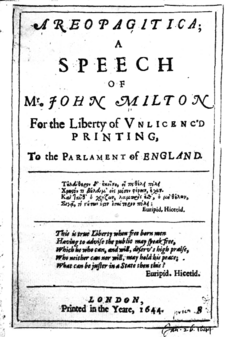
Milton was a "Christian Humanist poet" who cared deeply about individual freedom. He lived during a time when England was in turmoil. He was a Puritan, but he didn't always agree with his own party on political matters. His political ideas were shaped by his strong faith and his belief in human potential.
Milton's political ideas changed over time. From 1641–42, he focused on church politics and fighting against bishops. After writing about divorce, he wrote from 1649–54 to defend the execution of King Charles I and the new Parliamentarian government. Then, in 1659–60, he tried to prevent the return of the monarchy.
Milton's belief in republicanism (a government without a king) was often unpopular. In later centuries, he was seen as an early supporter of liberalism, which emphasizes individual rights and freedoms.
He praised Oliver Cromwell when Cromwell became Lord Protector. However, Milton later had doubts when Cromwell seemed to move away from revolutionary ideas. When Cromwell's son, Richard, lost power, Milton hoped for a freer republic. He wrote The Ready and Easy Way to Establish a Free Commonwealth in 1660, arguing for a government run by a council of wise people, not a king. However, most people wanted the king back. When Charles II returned, Milton, who had supported those who executed the king, was silenced on political matters.
Religious Views
Milton was not a priest or a theologian, but religion was very important to his thinking. He was a Calvinist, a type of Protestant, but his ideas were also influenced by Renaissance humanism. He tried to combine Christian beliefs with classical Greek and Roman ideas. In his early poems, he often showed a struggle between good and evil, with good being linked to Protestantism.
Milton used many quotes from the Bible in his works. He often changed them slightly to fit his purpose. He could read the Bible in Latin, Greek, and Hebrew.
Milton held some Christian views that were different from the main beliefs of his time. For example, he was accused of not believing in the Trinity (God as Father, Son, and Holy Spirit), thinking instead that the Son was less important than the Father.
In his 1641 book, Of Reformation, Milton showed his dislike for Catholicism and bishops. He saw Rome as a modern Babylon and bishops as harsh rulers. These ideas fit with his Puritan preference for images from the Old Testament.
During the time when England had no king, Milton often saw England as a special nation, like ancient Israel in the Old Testament. He saw Oliver Cromwell as a modern-day Moses. These views were connected to Protestant ideas about the Millennium, a time of peace and justice that some believed would come to England.
The return of the monarchy in 1660 started a new phase in Milton's work. In Paradise Lost, Paradise Regained, and Samson Agonistes, Milton mourns the end of the godly Commonwealth. The Garden of Eden might represent England's recent fall from grace. Samson's blindness and captivity, which mirrored Milton's own lost sight, could be a symbol for England blindly accepting Charles II as king.
Even though the monarchy returned, Milton did not lose his personal faith. Samson shows that losing national salvation didn't mean losing individual salvation. Paradise Regained expresses Milton's continued belief in Christian salvation through Jesus Christ.
Religious Tolerance
In Areopagitica, Milton called for "the liberty to know, to utter, and to argue freely according to conscience, above all liberties." He believed that people should be free to express their religious beliefs without the government forcing them to follow a certain church. He argued that the government should not control people's consciences.
Divorce Ideas
Milton wrote The Doctrine and Discipline of Divorce in 1643, at the start of the English Civil War. In this book, he argued that divorce should be a private matter, not something controlled by law or the church. He presented his ideas to the Westminster Assembly, a group of religious leaders.
Milton's ideas on divorce caused him some trouble with the authorities. However, the Westminster Assembly later allowed for divorce in certain cases, like abandonment. So, some Christian groups, especially Puritans, agreed with some of Milton's views.
Legacy and Influence
Once Paradise Lost was published, Milton was immediately recognized as a great epic poet. He had a huge influence on English poetry in the 18th and 19th centuries. Many people thought he was as good as, or even better than, Shakespeare.
Milton's political ideas, along with those of other thinkers like John Locke, greatly influenced the American Revolution. Today, scholars who study Milton's life and work are called Miltonists.
In 2008, a short path in London called John Milton Passage was opened near where he was born.
William Blake's View
The poet William Blake thought Milton was the most important English poet. Blake saw himself as Milton's poetic "son." In his own poem, Milton: A Poem in Two Books, Blake even used Milton as a character.
Romantic Poets' View
The Romantic poets liked how Milton used blank verse (poetry without rhymes). William Wordsworth started his famous sonnet "London, 1802" with "Milton! thou should'st be living at this hour." He also based his own long blank verse poem, The Prelude, on Paradise Lost.
John Keats found Milton's style difficult to copy. He felt that Paradise Lost was a "beautiful and grand curiosity." His own unfinished epic poem, Hyperion, felt too much like Milton's style to him.
Later Influence
Milton's influence continued in the Victorian age. Thomas Carlyle called him the "moral king of English literature." Even though some 20th-century critics like T. S. Eliot didn't always like Milton's style, his importance remained strong.
Milton's Areopagitica is still important today and is often mentioned when discussing the First Amendment to the United States Constitution (freedom of speech) in the United States. A famous quote from Areopagitica – "A good book is the precious lifeblood of a master spirit, embalmed and treasured up on purpose to a life beyond life" – is displayed in many public libraries.
The title of Philip Pullman's popular His Dark Materials book series comes from a line in Paradise Lost: "His dark materials to create more worlds." Pullman wanted to make Milton's poem understandable for teenagers and called Milton "our greatest public poet."
Many other famous books have titles taken from Milton's writings, such as Thomas Wolfe's Look Homeward, Angel and Aldous Huxley's Eyeless in Gaza.
Literary Style
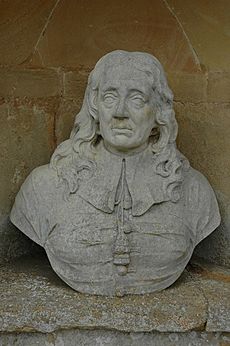
Milton's use of blank verse and his unique style, like his grand language and special word choices, influenced later poets. At the time, blank verse was mostly used in plays. Paradise Lost made it popular for other types of poetry.
Milton's choice not to use rhyme was seen as a big change. Before him, English poetry often had a very regular rhythm and rhyme. Milton changed this by using different rhythms and moving pauses around in his lines. He believed these changes showed a mix of "order and freedom."
Milton also used many new words from Latin and old words that were no longer common. This "Miltonian dialect" was copied by later poets. After Milton, English poetry paid more attention to the deeper meaning and imaginative power of words.
Music Inspired by Milton
Milton's poem At a solemn Musick was set to music for choir and orchestra by Hubert Parry. His poem On the Morning of Christ's Nativity was also set as a large choral work. Milton also wrote the hymn "Let us with a gladsome mind". His poems 'L'Allegro' and 'Il Penseroso' were set to music by the famous composer Handel.
Major Works
Poetry and Plays
- 1629: On the Morning of Christ's Nativity
- 1630: On Shakespeare
- 1632: L'Allegro
- 1632: Il Penseroso
- 1634: Comus (a play with music and dance)
- 1637: Lycidas
- 1645: Poems of Mr John Milton, Both English and Latin
- 1652: When I Consider How My Light is Spent (often called "On his blindness")
- 1667: Paradise Lost
- 1671: Paradise Regained
- 1671: Samson Agonistes
- 1673: Poems, &c, Upon Several Occasions
Prose (Essays and Books)
- Of Reformation (1641)
- Of Education (1644)
- Areopagitica (1644)
- The Tenure of Kings and Magistrates (1649)
- Eikonoklastes (1649)
- Defensio pro Populo Anglicano (First Defence) (1651)
- Defensio Secunda (Second Defence) (1654)
- A Treatise of Civil Power (1659)
- The Ready and Easy Way to Establish a Free Commonwealth (1660)
- The History of Britain (1670)
- Of True Religion (1673)
Images for kids
-
Portrait of Milton at age 10 in Milton's Cottage, Chalfont St Giles painted by Cornelis Janssens van Ceulen
-
Title page of the 1644 edition of Areopagitica
-
The back of no 19 York Street (1848). In 1651, Milton moved into a "pretty garden-house" in Petty France, Westminster. He lived there until the Restoration. Later it became No. 19 York Street, belonged to Jeremy Bentham, was occupied successively by James Mill and William Hazlitt, and finally was demolished in 1877.
-
Engraving by William Faithorne, 1670
-
Milton Dictates the Lost Paradise to His Three Daughters, ca. 1826, by Eugène Delacroix
-
Title page of John Milton's 1644 edition of Areopagitica
-
Milton is commemorated in the temple of British Worthies, Stowe, Buckinghamshire
See Also
 In Spanish: John Milton para niños
In Spanish: John Milton para niños
 | May Edward Chinn |
 | Rebecca Cole |
 | Alexa Canady |
 | Dorothy Lavinia Brown |


